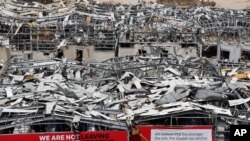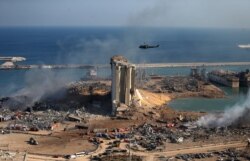The U.N. Development Program warns the explosion at the Port of Beirut has unleashed tons of hazardous waste that pose enormous threats to health and the environment if not disposed of properly.
The prognosis is not good. U.N. officials say the situation preceding the blast that turned parts of Lebanon’s capital city into rubble was already dismal. They say huge quantities of construction and demolition waste were generated when the 2,750 tons of ammonium nitrate stored at the port exploded nearly one month ago.
Jihan Seoud is program manager of UNDP’s Environment and Energy Program in Lebanon. She says the amount of toxic waste discharged by the blast is estimated between 100,000 and 800,000 tons.
She says the likely impact of hazardous waste from chemical contamination produced by materials such as pesticides, pharmaceuticals, industrial chemicals, lead and heavy metals is of great concern.
“These chemicals can have a negative effect on health of people that are exposed to them and can also contaminate the soil and water… Initial reports of air pollution from the blast is now considered to be limited. However, chemical contamination of particles that were scattered by the explosion may become airborne again and could pose a public health risk,” she said.
Seoud warns marine life also could be contaminated by seeping chemicals if the waste in the port is not contained and treated properly. She says the safe disposal of the toxic waste is a big problem because Lebanon has limited land available for landfilling.
She says the country also has no hazardous waste storage or treatment facilities. To make things worse, the U.N. official says the blast severely damaged one of the two municipal waste facilities in Beirut. She adds the facility that remains is unable to handle the amount of waste being generated.
“It is filling up faster and we already have a potential crisis because of that because the landfill is reaching its capacity. So, this was a pre-existing situation in the country that has only worsened and been compounded by the blast," she said. "This is also why the debris and the waste from the blast should not go to the municipal landfills because there is not room and capacity there. They should be treated separately.”
Seoud says the U.N. and the European Union are working together to ensure that debris removal and waste management is done properly and in an environmentally sound manner. She says the cost of this operation is estimated at more than $100 million.





